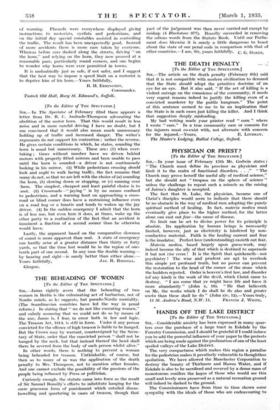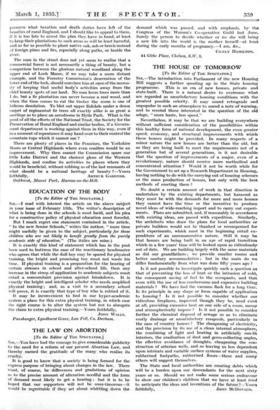HANDS OFF THE LAKE DISTRICT
[To the Editor of THE SPECTATOR.] SIR,—Considerable anxiety has been expressed in many quar- ters over the purchase of a large tract in Eskdale by the Forestry Commission, and I should be grateful if I could induce you to add the powerful influence of your paper to the protests which are being made against the profanation of one of the least spoiled valleys of the Lake District.
The very compactness which makes this region a paradise for the pedestrian makes it peculiarly vulnerable to thoughtless spoliation. We have allowed the Manchester Corporation to destroy the beauty of Thirhnere and Hawes Water, and if Eskdale is also to be sacrificed and covered by a dense mass of monotonous conifers the hopes of those who would see this small and lovely area preserved as a natural recreation ground will indeed be dashed to the ground.
The Commissioners have from time to time shown some sympathy with the ideals of those who are endeavouring to preserve what taxation and death duties have left of the beauties of rural England, and I should like to appeal to them, if it is too late to arrest the plan they have in hand, at least to keep their plantations to such areas as will be least harmful, and as far as possible to plant native oak, ash or beech instead of foreign pines and firs, especially along paths, or beside the river.
The man in the street does not yet seem to realize that a commercial forest is not necessarily a thing of beauty, but a comparison between the glorious natural woodland along the upper end of Loch Maree, if we may take a more distant example, and the Forestry Commission's desecration of the lower end of the loch, should convince him at once of the necess- ity of keeping that useful body's activities away from the chief beauty spots of our land. No man loves trees more than I do, but a fir plantation can never become a real wood, and when the time comes to cut the timber the scene is one of hideous desolation. To blot out upper &Male under a dense carpet of regimented 'fit trees all exactly alike is as great a sacrilege as to place an aerodrome in Hide Park. What is the good of all the efforts of the National Trust, the Society for the Preservation of Rural England and similar bodies, if a Govern- ment department is working against them in this way, even if in a moment of repentance it may hand over to their control the • mountain tops which it cannot use ?
There are plenty of places in the Pennines, the Yorkshire Moors or Central Highlands where even conifers would be an improvement. Why then cannot the Commission spare our little Lake District and the choicest glens of the Western Highlands, and confine its activities to places where they would be beneficial, without robbing us of the last remnants of what should be a national heritage of beauty ?—Yours



























































 Previous page
Previous page